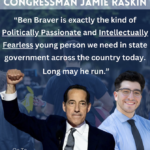The House braced for a difficult vote set for Monday on a $700 billion rescue of the financial industry after a weekend of tense negotiations produced a plan that Congressional leaders portrayed as greatly strengthened by new taxpayer safeguards.
The 110-page bill, intended to ease a growing credit crisis, came after a frenzied week of political twists and turns that culminated in an agreement between the Bush administration and Congress early Sunday morning.
The measure still faced stiff resistance from Republican and Democratic lawmakers who portrayed it as a rush to economic judgment and an undeserved aid package for high-flying financiers who chased big profits through reckless investments.
I have to count myself in the camp that thinks this bailout bill is a trap by the Republicans to tie the Democrats to Bush/Paulson and paint themselves as the populists looking out for the little guy. How telling is it that after all his earlier grandstanding, McCain declined to take credit for being part of this bailout bill?
A side-by-side comparison of the various bills does make the House bill look somewhat better (low bar that it is), but my big fears are that 1) it's all sound and fury, because they don't have the votes for it and more importantly, 2) without critical systemic changes, we find ourselves right back in the same spot in a few months. As Krugman says:
The fundamental problem with our financial system is that the fallout from the housing bust has left financial institutions with too little capital. When he finally deigned to offer an explanation of his plan, Mr. Paulson argued that he could solve this problem through "price discovery" - that once taxpayer funds had created a market for mortgage-related toxic waste, everyone would realize that the toxic waste is actually worth much more than it currently sells for, solving the capital problem. Never say never, I guess - but you don't want to bet $700 billion on wishful thinking.
I simply cannot understand how throwing good (or more critically in this case, taxpayer) money after bad changes anything other than temporarily delaying the collapse of companies with bad business models. I'm not convinced that the Democratic leadership haven't been pressured unduly to come up with something too hastily, too accomodating to the Bush administration and just not far enough to ensure that this won't happen over and over and over again. Minimally, a return of the Glass Steagall Act (something like the plan advocated by Thom Hartmann) would be nice to stem this tide.
While Krugman is on record as saying that there's enough oversight in the bill to "make it worth passing," I'm not convinced. There are some economists that think any bailout is unnecessary, but the freezing of credit lines by illiquid banks will make it difficult for small businesses to run too.
In the end, I'm hoping for a more liberal version of the Shock Doctrine. If crises are used to force citizens to accept policies we normally wouldn't, what is stopping us from using this crisis to move the country towards a more progressive future? To that end, I'm calling my Representative to urge a "No" vote on the bailout bill. If we're going to act, let's do it right.












